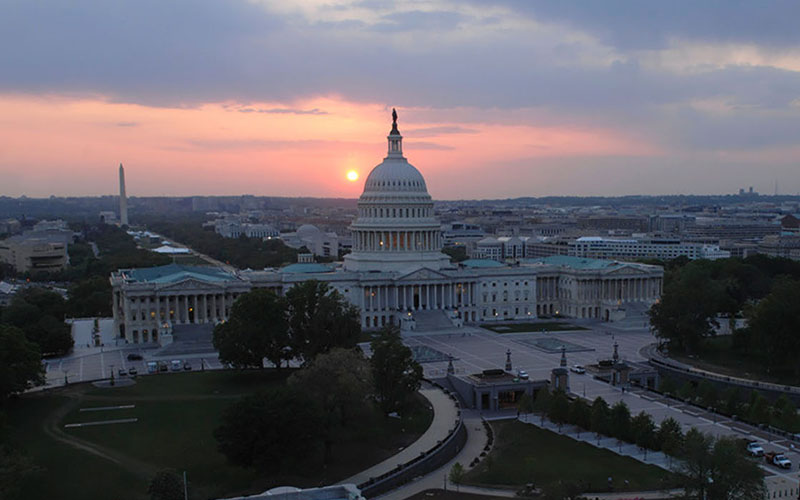
Congress has gone home for its regular monthly August recess – after talking about a delay – but faces a long list of work when it comes back after Labor Day, including health care, tax reform, the defense budget and the debt ceiling. (Photo courtesy Architect of the Capitol)
WASHINGTON – Senate leaders, backed by vocal conservatives in the House, vowed at the height of the health care debate to trim the usual month-long August recess and stay until at least the middle of the month to work on pressing legislation.
The middle of the month being Aug. 3, apparently.
The Senate gaveled out shortly after noon Thursday and won’t be back until Sept. 5 – when, in addition to health care, they will face a defense budget, the debt ceiling and calls for tax reform. House leaders never seriously considered staying and left for their home districts last week.
The retreat represents a “missed opportunity” for Republicans after seven months of controlling both chambers of Congress and the White House, said one analyst.
“Republicans wanted this session of Congress to be more productive than it’s been,” said Kyle Kondik, the managing editor of Sabato’s Crystal Ball at the University of Virginia Center for Politics. “The failure of healthcare in the Senate is a big setback for them, although I just feel like people have declared this thing dead in the House and Senate a dozen times already.”
The desire to get something done was behind the push by some Republicans to delay or eliminate the recess entirely.
“This is a once-in-a-generation opportunity to enact these transformative policies, so Congress should respond in a once-in-a-generation manner,” said Rep. Andy Biggs, R-Gilbert, in a June letter urging House Speaker Paul Ryan to cancel recess this year. That letter was signed by 11 others, including Rep. Paul Gosar, R-Prescott.
Biggs also wrote a column for Fox, in which he called the recess a “luxury” that the House cannot afford this year.
The House did manage to pass a bill that overhauled the Affordable Care Act, or Obamacare, making good on a promise Republicans have made since the bill was first passed seven years ago.
But repeated attempts to get some version of a repeal or replacement of the ACA through the Senate ended with thumbs-down from Sen. John McCain, R-Arizona, in the early-morning hours of July 28. McCain joined two other Republicans and all 48 Senate Democrats to doom the bill.
Jason Rose, a Scottsdale-based Republican political consultant, called the legislative defeats “dispiriting.”
He said being a Republican after this tumultuous summer feels like being “a United Airlines employee after a certain video came out,” referencing an incident in which police forcibly removed a passenger from an overbooked flight in April. Cell phone videos of the incident sparked a public relations nightmare for the company.
Rose said a series of unforced errors by President Donald Trump had muddied the waters and left Americans frustrated.
“The body politic is just not buying into his shtick right now,” he said of Trump.
Kondik agreed that public patience with this latest round of Washington drama may be wearing thin.
“There’s only so much time to do these things, and I think the closer you get to an election, the less interest there is in doing politically unpalatable things,” he said.
Senate Majority Leader Mitch McConnell said during one of the early rounds of the health care fight that the Senate would delay its recess for at least two weeks to work on health care and other measures. That action drew praise from Biggs.
“The American people entrusted us with the House, Senate, and White House because of the promises we made to them,” Biggs said in a statement then. “The American people will not tolerate any more excuses for work left undone or half-done, and I am committed to staying in session as long as it takes to accomplish our goals.”
Even after the health care vote failed, a beleaguered McConnell said the Senate would stay and turn its attention to other matters. But after a week in which it mostly approved presidential nominees, the senators left for home Thursday.
Lawmakers could not be reached for comment on the schedule change Friday – they were all out of town.
– Cronkite News reporter J.T. Lain contributed to this report.